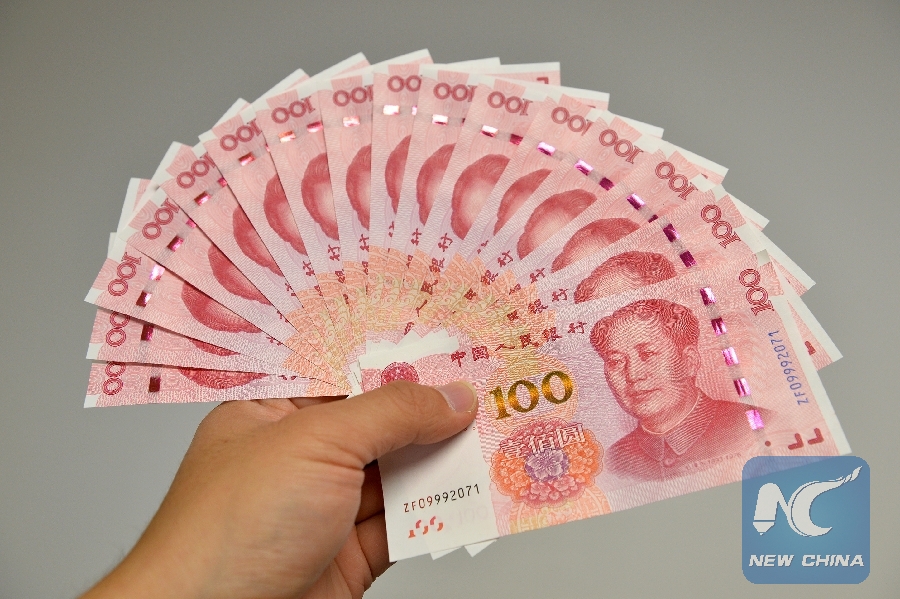
Photo taken on Nov. 12, 2015 shows newly-released 100-yuan bank notes in Beijing, capital of China. (Xinhua/Li Xin)
WASHINGTON, April 11 (Xinhua) -- Widespread use of the Chinese currency renminbi (RMB) or yuan internationally is a trend, and China's economic rebalancing will facilitate that process, a senior official of the International Monetary Fund (IMF) has said.
"Given China's importance in the global economy, there is little question that the international use of the RMB will rise over time," Zhang Tao, deputy managing director of the IMF, told Xinhua in a recent interview. "In the short term, fluctuations in trade, capital flows and exchange rates may affect the trend," he added.
Zhang hailed the inclusion of the RMB into the IMF's Special Drawing Right (SDR) basket as "an important milestone for the Fund and the global economy."
The Chinese yuan's share of currency reserves increased to 1.89 percent in the fourth quarter of 2018, the highest since the IMF began releasing yuan's data in late 2016, according to the IMF's newly released data on currency composition of official foreign exchange reserves.
What is important, Zhang said, is that the Chinese authorities continue to pursue a policy framework that rebalances the economy in a more sustainable direction -- from investment and exports to domestic demand, particularly consumption.
"If rebalancing is successful, RMB internationalization will take care of itself," he added.
Over the course of last year, China announced a series of policies to further open up its financial sector, with reforms involving treatment to foreign banks, the insurance sector, the securities market, among others.
Zhang said the opening-up of the Chinese financial sector "helps make China's financial markets more modern and efficient, which in turn will help make better use of China's savings."
"For foreign investors, China's financial markets offer an opportunity to benefit from China's ongoing strong growth, as well as to invest in a large and diversified economy," he said.
Zhang's remarks came against the backdrop of global index provider MSCI announcing in February that it plans to increase the weight of China A-shares, or Chinese mainland shares denominated in yuan, in the MSCI indices.
MSCI said in a statement on Feb. 28 that it will quadruple the weighting of China A-shares in its global benchmarks by increasing the inclusion factor from the current 5 percent to 20 percent.
A separate advancement in China's financial sector integration has to do with its bond market. Starting April, China's yuan-denominated bonds have been added to the Bloomberg Barclays Global Aggregate Index.
Citing the IMF's new book released in March titled "The Future of China's Bond Market," Zhang said China's bond market has a "bright" potential for development.
"Market sentiment improved recently," Zhang said. "Both U.S. and Chinese equity markets are both up since January."
As regards the U.S. Federal Reserve adopting a more patient and flexible policy stance by keeping the federal funds rate unchanged after concluding its latest policy meeting in March, Zhang said this shift in monetary policy supported the positive risk sentiment in equities as well as global markets, including broad emerging market assets.
"Along with the boost of asset prices, portfolio inflows to emerging market economies have resumed meaningfully in 2019," he said, adding that many emerging market economies and corporates have taken advantage of the more favorable environment and easier financial conditions to issue new debt, including first-time sovereign issuers with weak debt-management capacity.
However, Zhang warned that some emerging economies with higher vulnerabilities "are likely to be more prone to funding problems during risk-off episodes and sudden changes in global sentiment."
On the IMF's quotas and governance reform, Zhang said the international lender "is adequately resourced at this point" with a total lending capacity of about 1 trillion U.S. dollars.
"There is broad support among our members on ensuring that the IMF remains strong and well-resourced, so that it can play its role as a global financial backstop in the event of downturn," he said.
Quotas are the principal source of financial resources for the IMF to lend to its members. Upon joining the IMF, each member contributes a certain amount of money, known as quota subscription. The volume of the quota varies depending on the member's relative size in the world economy.
"Going forward, we also remain committed to the realignment of quota shares to more accurately reflect members' representation," Zhang said.

